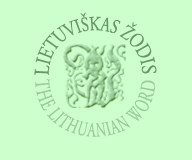Vaclovas BIRŽIŠKA (1884-1956),
jurist and bibliographer, born in Viekšniai in the province of
Samogitia on Dec. 2, 1884, son of Antanas Biržiška. In 1903 he began
studying science and mathematics at the University of St. Petersburg,
later changing to law, history, and ethnography. He graduated from the
faculty of law at St. Petersburg in 1909 and until World War I
practiced law in Vilnius and Šiauliai. From 1914-17 he served as an
officer in the Russian army. After the Russian revolution, he worked
in Moscow (1918) in the archives of the commissariat for Lithuanian
affairs. During the Bolshevik occupation of Vilnius, from January to
April, 1919, he was initially commissar for education and later deputy
commissar for education in the Soviet government of V.
Mickevičius-Kapsukas. While serving in these posts he defended
Lithuanian and Polish activists from Bolshevik arrest, secretly
maintaining contact with pa- triotic Lithuanian organizations. From
the spring of 1920, while the Lithuanians, Poles, and Bolsheviks were
fighting for Vilnius, he taught in Lithuanian schools. After the
Polish seizure of Vilnius on Oct. 9, 1920, he withdrew to Kaunas where
he lived until the Russian occupation in 1944.
In independent Lithuania from 1920-23 he
served in the army as assistant to the commander of a battalion, as
chairman of a regimental military court, and as head of the army's
educational branch. Becoming progressively more involved in academic
work, he resigned from the regular army and joined the reserves as a
lieutenant colonel.
He began his academic career in Vilnius
in 1919 as a lecturer in law at the Advanced School of Arts and
Sciences. From 1920-22 he was lecturer at the School of Arts and
Sciences in Kaunas. When this school became a university on Nov. 22,
1922, he was appointed assistant professor in the faculty of law; on
June 1, 1924 he became an associate professor, and on Nov. 1, 1931,
professor. He lectured on administrative law in the faculty of law, at
the same time lecturing on Lithuanian bibliography in the faculty of
humanities. He also held administrative posts at the university: from
1922-33 as secretary of the faculty of law, from 1933-35 as dean of
the faculty of law, from 1923-44 as librarian of the University of
Kaunas, from 1940-41 as dean of the faculty of law at the
University of Vilnius as well as its librarian. During the German
occupation from 1941-43 he lectured on bibliography at the University
of Kaunas (faculty of philosophy), where he organized a separate
department of library science. From 1946-49 he was a professor at the
Baltic University in Hamburg and Pinneberg. In the United States
during 1951-53 he was consultant to the Library of Congress in
Washington. He died in Waterbury, Connecticut on Jan. 3, 1956.
Biržiška devoted most of his attention
and efforts to Lithuanian bibliography. While still a student, he col
lected material in the libraries of Vilnius and St. Petersburg and
elsewhere on the history of Lithuanian books and manuscripts.
Appointed in 1923 to organize the library of the University of Kaunas,
he managed in 20 years to increase its size from 40 volumes to over
200,000, making it one of the largest libraries in independent
Lithuania, with a comprehensive section on Lithuanian studies and an
extensive collection of manuscripts. From 1924 the Lithuanian
Institute of Bibliography, headed con tinuously by Birziska, was
operated as part of the library. Thus he established suitable
conditions for the systematic and scientific study of Lithuanian
bibliography (see Bibliography).
He wrote much concerning bibliography
and cultural history in periodical literature, in the Lithuanian
Encyclopedia, of which he was editor in Kaunas from 1932-44 and in
Boston from 1951-53, as well as in his own works dealing mainly with
early Lithuanian literature. In his studies he brought to light many
heretofore unknown works and authors, compiled about 400 biographies
of early Lithuanian writers, and published numerous documents
contributing to the understanding of Lithuanian culture from the 16th
to the 19th centuries. Through' his scholarly studies and research he
became known as one of the foremost Lithuanian cultural historians and
bibliographers.
The writings of Biržiška consist of
about 13,000 articles in periodicals and in the encyclopedia and over
50 separate publications. His more comprehensive articles on cultural
history were published posthumously under the title Praeities
Pabiros (Scatterings from the Past), Brooklyn, 1960. His largest
bibliographical work, Aleksandrynas (3 vols., Chicago,
1960-65), was also published only after his death. It contains the
biographies and lists the works of over 370 early (up to 1865)
Lithuanian writers. The author devoted many years of effort to this
work, using sources, which are now either reached only with great
difficulty or entirely destroyed. Among other noteworthy works are
bibliographic publications: Lietuvių bibliografija 1547-1910
(Lithuanian Bibliography 1547-1910), 5 vols., Kaunas, 1924-39; Lietuvių
knygos istorijos bruožai (An Outline of the History of Lithuanian
Books), Kaunas, 1930; Lietuviškieji slapyvardžiai ir
slapyraidės (Lithuanian Pseudonyms and Cryptograms), 2 vols.,
Kaunas, 1943-44; Lietuvių rašytojų kalendorius (A
Calendar of Lithuanian Writers), Tubingen, 1946; Senųjų
lietuviškųjų: knygų istorija (A History of Early
Lithuanian Books), 2 vols., Chicago, 1953-57; The American
Lithuanian Press 1875-1910 (manuscript in the Library of
Congress), 1950; Abraham Kulvietis (English), Pinneberg, 1947;
and Martin Mažvydas und seine Mitarbeiter, Heidelberg,
1948. In addition he edited the following journals of bibliography and
cultural history: Knygos (Books), 1922-26; Bibliografijos
žinios (Bibliographic News), 1928-41; and Mūsų
Senovė (Our Antiquity), 1937-1940.
Text from the ENCYCLOPEDIA LITUANICA I-VI.
Boston, 1970-1978

